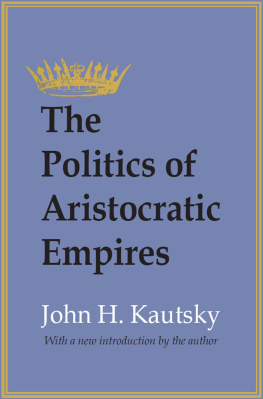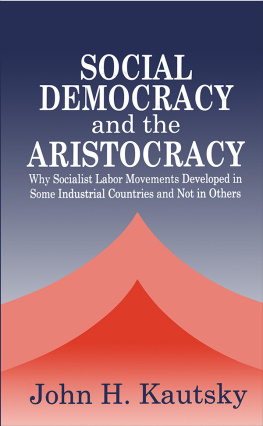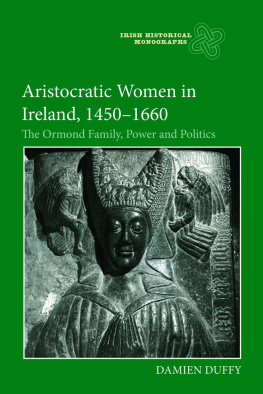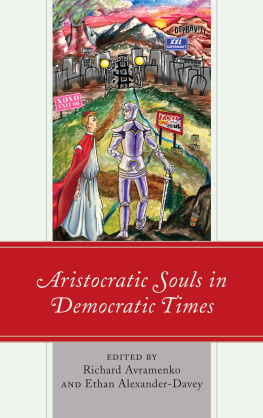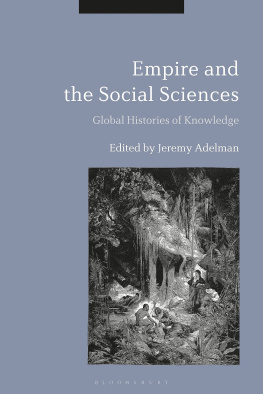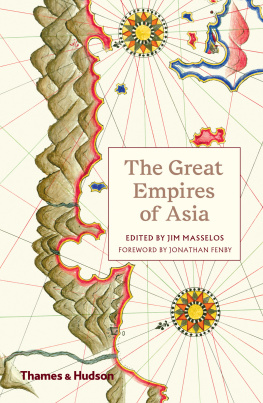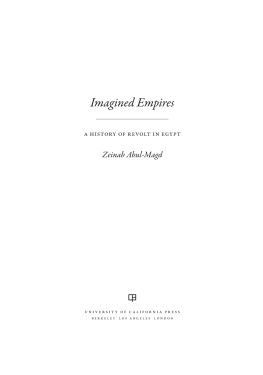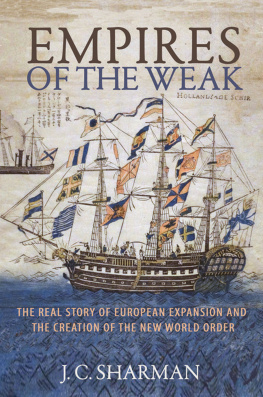Originally published in 1982 by The University of North Carolina Press.
Published 1997 by Transaction Publishers
Published 2017 by Routledge
2 Park Square, Milton Park, Abingdon, Oxon OX14 4RN
711 Third Avenue, New York, NY 10017, USA
Routledge is an imprint of the Taylor & Francis Group, an informa business
New material this edition copyright 1997 by Taylor & Francis.
All rights reserved. No part of this book may be reprinted or reproduced or utilised in any form or by any electronic, mechanical, or other means, now known or hereafter invented, including photocopying and recording, or in any information storage or retrieval system, without permission in writing from the publishers.
Notice:
Product or corporate names may be trademarks or registered trademarks, and are used only for identification and explanation without intent to infringe.
Library of Congress Catalog Number: 96-17936
Library of Congress Cataloging-in-Publication Data
Kautsky, John H., 1922
The politics of aristocratic empires / John H. Kautsky; with a new introduction by the author.
p. cm.
Originally published: Chapel Hill: University of North Carolina Press, c1982.
Includes bibliographical references and index.
ISBN 1-56000-913-6 (paper : alk. paper)
1. Aristocracy (Political science) I. Title.
JC414.K38 1996 | 96-17936 |
306.2dc20 | CIP |
ISBN 13: 978-1-56000-913-9 (pbk)
The Politics of Aristocratic Empires was first published in 1982 and went out of print in 1990. Now, as it is being reissued, it is, with respect to its subject matter, no morebut also no lessout of date than when it was written. The book remains relevant as an example of and plea for a possible rapprochement of the disciplines of political science and history. I continue to believe that political science can be enriched by the greater use of the immense treasury of data on the past made available by historians and that the study of history could be advanced if historians more often asked and sought to answer political science questions and dared to develop generalizations across time and space. Although I never expected to have any great impact on the way most political scientists and historians go about their business, I thought it was worthwhile to attempt one small bridge across the gap between the two disciplines.
I was also well aware all along that, while bridging the gap was one way of describing my attempt, falling between two stools could be another. Of course, I cannot tell whether or to what extent political scientists and historians were simply not interested in what I tried to do. I can, however, seek to recall how some of those who did read the book responded to it. To do so, I have just reread a dozen or so reviews of it.
One review deserves special mention, not only because of its prominence, but because it is the only one that totally rejected my enterprise without ever really commenting on the substance of my book, let alone offering any serious criticism of it. Elie Kedourie used his lengthy essay Living off the peasants in the (London) Times Literary Supplement of December 9, 1983, to vent his spleen against comparison and generalizations. My attempt at a social scientific approach to history evidently made him so angry that he could only ridicule it. Taking a few passages, almost all from my first introductory chapter, out of context, he mocked the clean, soaring, audacious lines of Kautskys comparatist [sic] castles and my Marxist master-key [which] will open many, many doors. After referring to a few other comparatists as so many mighty logomachs in all the glory of their flying banners, their clashing armour and their rich caparisons, he finally reached this preposterous conclusion: With the help of [my] observations, a definitions buff, tinkering with a bit of transformative logic, should have little trouble in establishing that the Soviet Union is a living example of aristocratic empire. This would be the breakthrough to a unified and really universal comparative science.
This quaint little essay by a distinguished scholar, can hardly beand was perhaps not even meant to betaken seriously, because it is so obviously preoccupied with attempts at cleverness both in its style and its substance. Apart from it, the reviews of The Politics of Aristocratic Empires were generally quite positive. Adjectives like admirable, ambitious, important, and impressive kept occurring in them, and my book was even variously described as an enormous and capable work of synthesis, a major achievement, a seminal work, and a major landmark in macro-social historical literature.To my amazement, I was even credited with awesome skill in exposition.
One reviewer thought that I gave probably the best account of [the] overall structure of aristocratic empires. Like others, he emphasized and approved of what he called my polemical arguments carried on against other theories current in comparative and historical sociology that there is no sharp difference between feudal and supposedly centralized bureaucratic empires and that the notion of society is misleading when applied to aristocratic empires.
Other controversial points that were appreciated by reviewers are: my argument that there is no clear distinction between Western and non-Western empires before the beginnings of modernization; my observation that peasant revolutions are almost totally absent from aristocratic empires; my analysis of the political impotence of the peasantry and the marginality of the townspeople as a distinctive feature of politics in aristocratic empires; and my discussion of the limited impact of the aristocratic language and religion on their conquered people.
Gratifying as such positive comments were, I was even more pleased that most of the reviewers also offered thoughtful criticism. Some of it, however, seems to me to be the result of misunderstandings. As these may well be due to my own failure to be sufficiently clear, future readers may similarly misunderstand what I wrote. In the hope of reducing the risk of misunderstanding among readers of this edition, I will respond to some reviews here in more or less general terms. I do not mean to argue with the reviewers. That would probably be useless and certainly in bad taste. To avoid giving any such impression, I shall not identify them.
It may be that the title of my book aroused expectations I do not and never intended to fulfill. Thus, one reviewer was clearly disappointed, because I do not deal with the politics of the peasantry, except as it affects the aristocracy. Obviously, the overwhelming majority of the population of aristocratic empires consists of peasants, so a book entitled The Politics of Aristocratic Empires could be expected to deal with intra-village peasant politics. I argue, however, that an aristocratic empire is composed of an aristocratic society distinct from peasant societies, and so my concern was solely with the politics of the aristocracy.
On the other hand, my book is not concerned with all empires in which aristocrats were prominent, but only with what I sometimes call pure or traditional aristocratic empires, those not subject to commercialization, an early form of modernization. I provide a long list of examples of such empires on . Originally, I had entitled my manuscript The Politics of Traditional Empires, but was persuaded to substitute aristocratic for traditional. Neither adjective, by itself, is really satisfactory, but I still cannot think of a better one.

